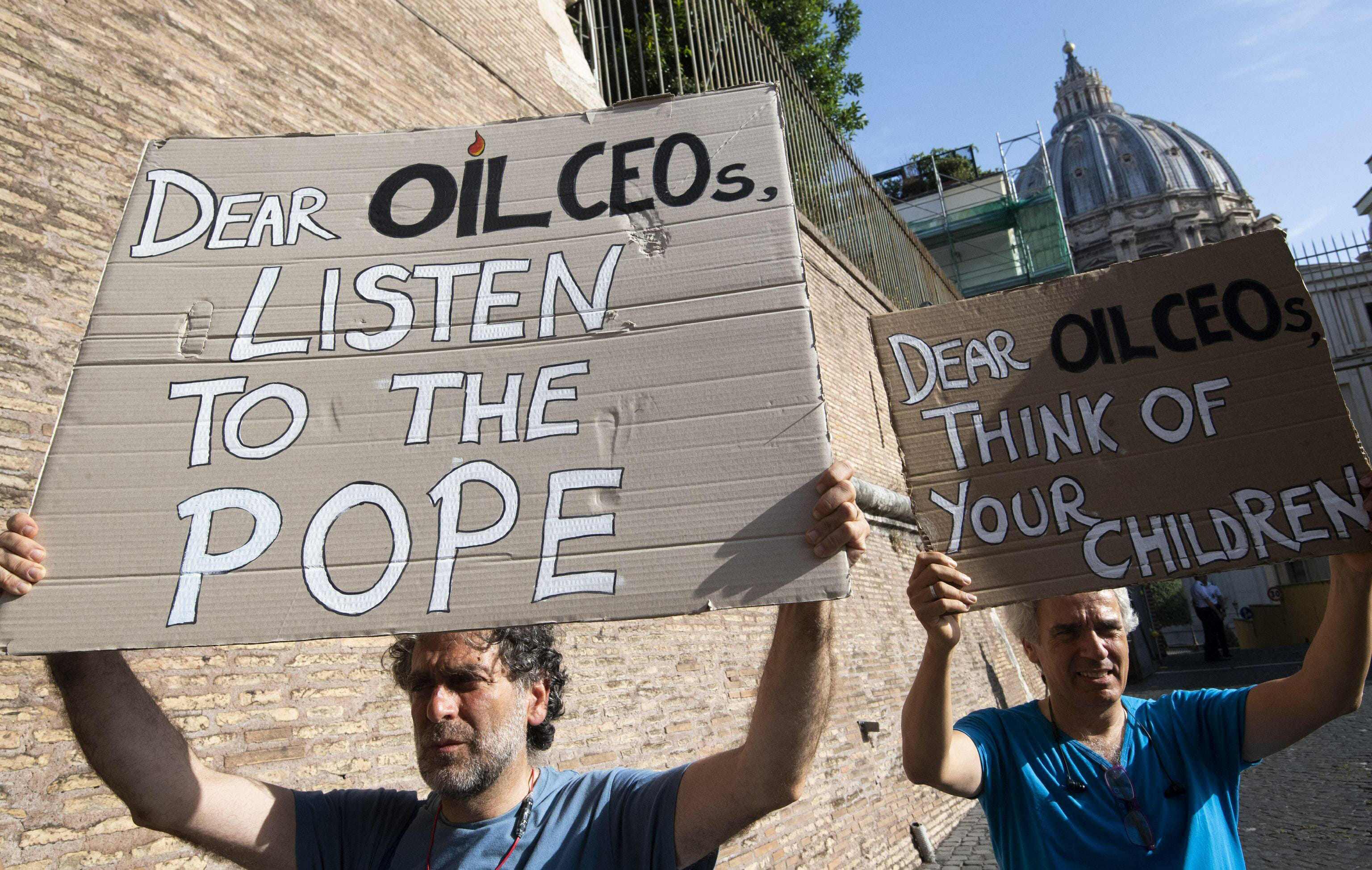
Pope warns oil execs of need for "rapid" energy transition
VATICAN CITY (AP) — Some of the world’s major oil producers pledged Friday to support “economically meaningful” carbon pricing regimes after a personal appeal from Pope Francis to avoid “perpetrating a brutal act of injustice” against the poor and future generations.
The companies, including ExxonMobil, BP, Royal Dutch Shell, Total, Chevron and Eni, said in a joint statement at the end of a Vatican climate summit that governments should set such pricing regimes at a level that encourages business and investment, while “minimizing the costs to vulnerable communities and supporting economic growth.”
The CEOs, as well as leaders of major asset managers such as BlackRock and BNP Paribas, also called for companies to provide investors with clarity about the risks climate change poses to their businesses and how they plan to transition to cleaner energy sources.
The joint statement was issued at the end of a closed-door summit in the Vatican gardens, the second time the Holy See has convened the world’s petroleum leaders for private talks on climate change, scientific research and the moral imperative to save God’s creation.
Francis attended Friday’s session and told the gathering that a “radical energy transition” to clean, low-carbon power sources was needed and that if managed well, would “generate new jobs, reduce inequality and improve the quality of life for those affected by climate change.”
“Faced with a climate emergency, we must take action accordingly, in order to avoid perpetrating a brutal act of injustice toward the poor and future generations,” he said.
He praised the executives in particular for taking on the core issue of carbon pricing, which he said was necessary for humanity to use the resources of creation wisely and not burden the poor and future generations with the debt incurred by the rich.
In their joint statement, the CEOs said “Reliable and economically meaningful carbon pricing regimes, whether based on tax, trading mechanisms or other market-based measures, should be set by governments at a level that incentivizes business practices … while minimizing the costs to vulnerable communities and supporting economic growth.”
The pledge comes ahead of a European Union summit next week at which leaders will discuss the bloc’s efforts to combat climate change including a proposal to stop adding carbon to the atmosphere by 2050. While the announcement refers to the 2015 Paris accord’s goal of “keeping global warming below 2 degrees Celsius (3.6 Fahrenheit)” by the end of the century compared to pre-industrial times, experts say capping the rise at 1.5 degrees Celsius (2.7F) would be safer.
The Carbon Tracker Initiative, a London-based group that examines the impact the shift away from fossil fuels has on financial markets, welcomed the Vatican announcement.
“It is important that many of the world’s largest publicly traded oil and gas companies and many of the world’s largest investors have endorsed carbon pricing regimes,” the group’s executive director, Mark Campanale, said in a statement.
“Critically, asset owners with trillions of dollars under management are also calling for company disclosures of meaningful and material information on plans and investments in the energy transition,” he added.
Outside the summit, around half-a-dozen protesters held up signs urging the oil executives to listen to the pope.
The meeting was held under unusual secrecy even by Vatican standards, with the program and guest list initially unpublished. A few executives confirmed their presence ahead of time, including the chief executives of BP and Eni, Bob Dudley and Claudio Descalzi.
On the BP blog, Dudley wrote this week that the meeting was coming at an urgent time, with BP’s own latest survey showing carbon emissions grew by 2% last year, even as experts say they have to dramatically decrease to meet standards set by the 2015 Paris climate accord.
Eni’s Descalzi said in a statement that four years after Paris, “it’s clear we have to change pace. Progress has been insufficient and the emissions continue to grow.”
The summit was co-organized by the University of Notre Dame, whose president, the Rev. John Jenkins, praised the commitment taken by the industry leaders.
The commitments taken “won’t solve the problem themselves,” he said. “But they’re extremely important first steps toward doing that.”
Francis has dedicated a major teaching document to the environment and is expected to press his case at a Vatican meeting of Amazon bishops later this year.
___
Jordans reported from Berlin.
The Western Journal has not reviewed this Associated Press story prior to publication. Therefore, it may contain editorial bias or may in some other way not meet our normal editorial standards. It is provided to our readers as a service from The Western Journal.
Truth and Accuracy
We are committed to truth and accuracy in all of our journalism. Read our editorial standards.
Advertise with The Western Journal and reach millions of highly engaged readers, while supporting our work. Advertise Today.












